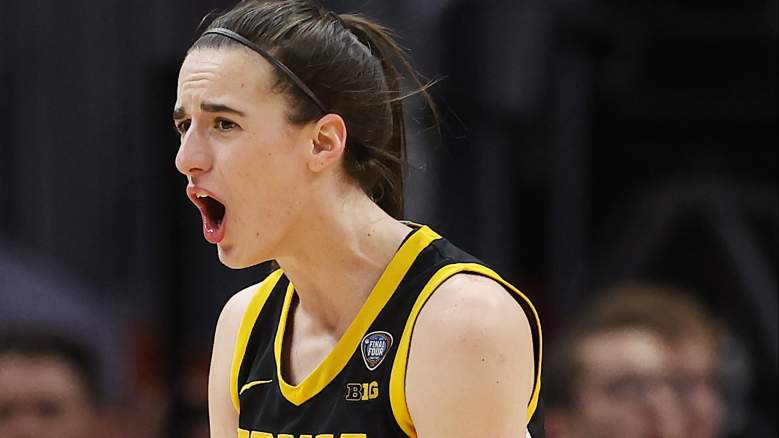Practice schedules, team meetings, locker room banter. But within minutes of ESPN breaking the headline—“Caitlin Clark Signs $1M WNBA Deal, Highest Ever for a Rookie”—everything changed.

Group chats exploded.
And in locker rooms across the country, jaws hit the floor.
For fans, it was a triumphant moment.
How Much Did Caitlin Clark Get to Play in Europe | TikTok
Clark, the University of Iowa phenom who shattered NCAA scoring records and drew millions to her televised games, was finally getting what she deserved—or so it seemed.
The WNBA had never seen numbers like this.
In a league historically underpaid, under-marketed, and under-appreciated, a $1M salary is seismic.
But inside the league, the energy wasn’t all celebration.
Because as soon as the confetti settled, a deeper question began to surface: Why her? Why now?
Sources say the reaction from veteran players was immediate—and tense.
One anonymous WNBA All-Star reportedly told a teammate, “I’ve been here 12 years and never touched $500K.

I bled for this league.
And now they throw a million at her? For what—followers?”
The bitterness wasn’t just about money.
It was about meaning.
Legacy.
WNBA Draft Ticket Prices Soar After Successful Caitlin Clark 2024 Season
The politics of visibility.
Clark’s rise has been meteoric, no doubt.
She’s been dubbed the “face of the WNBA” before even dribbling in a regular-season game.
Her college games brought in record-breaking viewership, her jersey sales outpaced NBA rookies, and her presence is undeniably magnetic.
She’s a walking brand.
A broadcaster’s dream.
But does popularity equate to value in a league that’s been built on grit and long-suffering loyalty?
Some say yes.
Mercury Star Diana Taurasi Slammed for Caitlin Clark Comments
The league’s front office reportedly sees her as a gateway drug to the mainstream audience the WNBA has long struggled to capture.
Ticket sales spike when she plays.
Merchandise sells out.
Sponsors follow her like bees to honey.
But others see it as a betrayal.
“She’s cashing in on a system that never rewarded us,” said one veteran forward who’s played for four different teams.
“We begged for raises.
We begged for better flights.
They told us there wasn’t enough money.
Caitlin Clark gets perfect pick-me-up as WNBA legend sends emotional injury message – The Mirror US
But somehow, for her, the budget opened like magic.”

That last line isn’t just salty—it’s pointed.
Because for years, WNBA players have battled for basic professional standards: commercial flights, livable salaries, off-season income security.
Many players have to go overseas just to make ends meet.
So when Clark’s deal shattered all previous benchmarks, it reopened old wounds.
And yet… here’s where the story twists.
Because Caitlin Clark didn’t ask for a revolution.
She is the revolution, whether she wanted it or not.
At 23, she’s being hailed as both savior and symbol—praised for her talent, but now blamed for a wage gap she didn’t create.
Clark herself responded to the backlash with surprising poise.
In a post-game press conference, she said, “I respect every woman in this league.
I know I stand on their shoulders.
If my salary opens doors, then I hope they all get paid more too.
”
It was the right thing to say—but not everyone bought it.
“She’s polished, I’ll give her that,” a former MVP said on Twitter.
“But if she really respected us, she’d be pushing the league to raise all salaries.
Not just hers.
”
The tension escalated when footage leaked from a team meeting where several veterans openly questioned the WNBA’s salary priorities.
One coach reportedly had to step in to calm the room.
And while no player has publicly attacked Clark by name, the passive-aggressive subtweets and cryptic Instagram stories tell their own story.
One simply read: “Popularity doesn’t equal impact.
Remember that.
”
The league is now in damage control mode.
WNBA President Cathy Engelbert made a statement assuring that “investment in top talent will benefit all players” and hinted that broader salary increases are being discussed for next season.
But the damage may already be done.
This one deal has drawn a red line in the sand between eras—before Clark, and after.
It has exposed the growing rift between younger stars with massive social reach, and veterans who built the league brick by brick, paycheck by paycheck.
There’s also a darker undertone: race.
While no one is saying it out loud in official press releases, whispers inside the league suggest the conversation is simmering around Clark’s image, branding, and mainstream acceptance—especially compared to Black players who’ve dominated the WNBA for decades with less fanfare and fewer endorsement deals.
And in that context, Clark’s million-dollar contract feels less like progress, and more like proof of what some players have been saying all along: visibility isn’t about merit—it’s about marketability.
Still, Clark remains poised and unshaken.
When asked about her goals, she kept it simple: “I want to win.
And I want to make this league better.
”
Only time will tell if she succeeds—or if the friction she unintentionally ignited burns hotter than the spotlight now following her every move.
But one thing’s for sure: Caitlin Clark just made history.
And the WNBA may never be the same again.